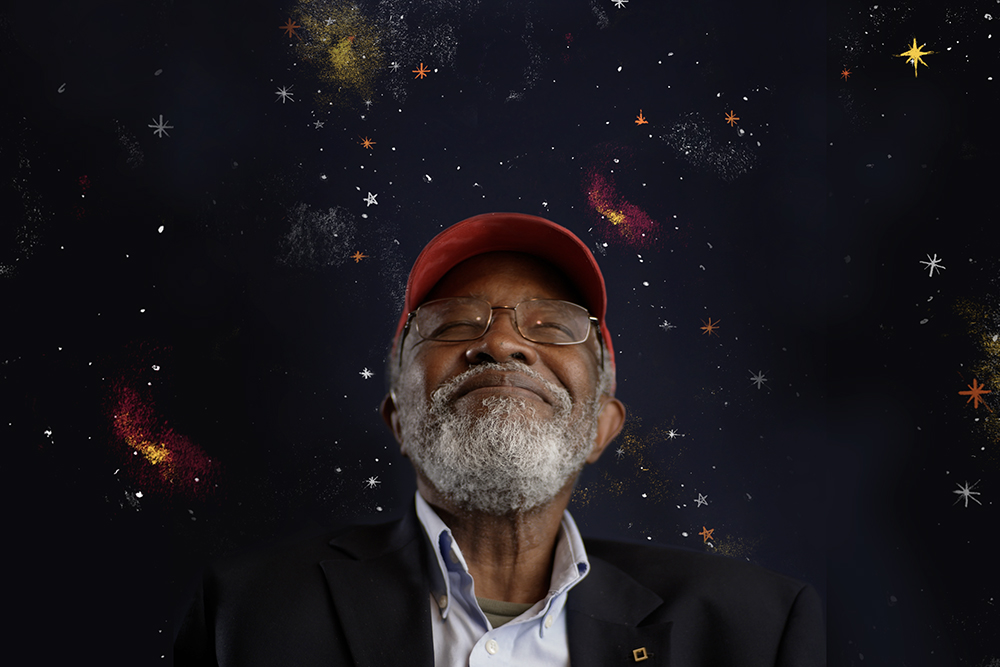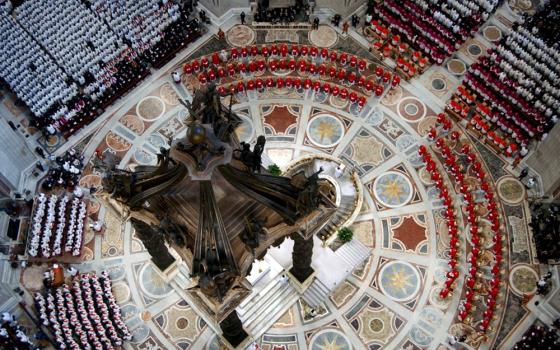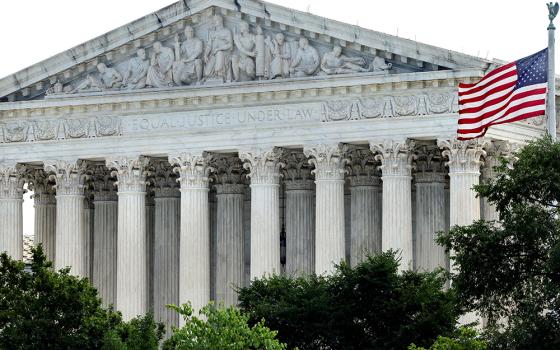
"Planetwalker" is a documentary about John Francis, an uncommon globetrotter who embarked on a yearslong silent trek for the environment. (Los Angeles Times)
Trudging cold and damp out of California's Redwoods, John Francis is ready to give up. Armed with a backpack and a banjo, he spies a truck parked up ahead. It's true, a catastrophic oil spill years earlier pushed him to swear off motorized vehicles, but now time is up. His peculiar journey has come to an end. "I'm getting in that truck," he thinks.
Francis approaches that oil-powered shelter and hears its motor roar. Too late. He watches his would-be refuge roll on toward its next destination. Fate says, "John, this is bigger than you." He agrees, and continues his 22-year sojourn on foot across God's creation.
Honest and humble stories like this one, which Francis himself told me in our interview for NCR, are what urged filmmakers Dominic and Nadia Gill to profile the environmentalist in their 30-minute documentary "Planetwalker." The film is a fascinating portrait of an uncommon globetrotter who provoked the concern of his family members, piqued the interest of the media, and pricked the conscience of the public through his silent trek for the environment.

Armed with a backpack and a banjo, John Francis depended on human kindness to survive his long journey of environmental demonstration. (Los Angeles Times)
Born in Philadelphia in 1946, Francis moved to Marin County, California during the peak of its counterculture movement in 1969. Two years later, large Standard Oil ships, blinded by a thick nighttime fog, collided under the Golden Gate Bridge and spilled 840,000 gallons of fuel into San Francisco Bay, killing thousands of aquatic birds and polluting a more than 10-mile stretch of the Pacific Ocean. (Francis later called this incident "an environmental insult.")
Accompanied by his then-partner Jean Lohman, Francis drove south from his home in Inverness to the blackened shores of Bolinas, a few miles northwest of San Francisco. The air was befouled by the noxious smell of decaying birds.
"I want to get my hands dirty with oil and fur and feathers," writes Francis in his 2005 autobiography. Then, he floats an idea to Lohman: "We could stop driving cars. Stop riding in them." She responds approvingly, but Francis is serious.
He gives up cars altogether and over the next couple of decades traverses the continental United States, hikes South America and sails the Caribbean. (There was no prohibition on sailing.) But his first two months of walking are especially difficult. He loses his job, his mother tells him this is "only a phase," his resolve begins to wear. "Sometimes I feel as if I am dying," Francis later writes. Still, he soldiered on.
And then he stopped speaking.
Francis took a vow of silence in 1973 and remained mute for 17 years until he had something to say. "The first time I took this vow ... was actually because I was arguing so much," Francis, now 78, explained in an interview with NCR. During his walks in Northern California, he would sometimes clash with residents who, Francis says, accused him of foregoing cars to make drivers look bad. "I realized when I did stop speaking I hadn't been listening," he said.
'I wouldn't have made it across America without human kindness. That's what I wanted to speak about when I started speaking,' John Francis told NCR.
A noted lecturer who worked with the U.S. Coast Guard on the Oil Pollution Act of 1990 and served as a goodwill ambassador for the U.N. Environment Program, Francis is fiercely intelligent and often funny. For someone who didn't utter a word for the entire 1980s, he has a lot to say. But refusing to talk and communicating through a personal version of sign language troubled his loved ones and earned him a reputation as the local eccentric.
In the documentary, friends and family struggle to describe Francis. They call him "charming," "unusual," "crazy." His father's work friends are succinct: "John's gone nuts."
His autobiography cites Thomas Merton as a particular inspiration for this period of silence. Francis excerpts remarks Merton made in Calcutta in October 1968:
There are always people who dare to seek, who are not dependent on social acceptance, not dependent on social routine, and prefer a kind of free-floating existence under a state of risk. ... The deepest level of communication is not communication, but communion. It is wordless. It is beyond words, and it is beyond speech, and it is beyond concept.
As I prepared for our interview, I had two burning questions for Francis: How did he survive two decades on foot — and what was his plan?
"My plan was to take another step," he laughs, calling himself "a pilgrim on a journey."
Advertisement
Throughout his travels, to quote Tennessee Williams, Francis depended on the kindness of strangers. His voyages were financed in part by donations from supporters. Often sleeping outside in a makeshift tent, he would occasionally stay with people who provided him shelter. He lived like a journeyman, offering his skills to those who housed him.
Studying for his master's degree, Francis taught classes — without speaking — as a teaching assistant. And when he arrived flat broke at the University of Missouri, "they gave me $100 in cash and said to register for one credit," he said.
"I wouldn't have made it across America without human kindness. That's what I wanted to speak about when I started speaking," he told NCR.
When the Gills first stumbled across Francis' story online, Dominic, an environmental scientist turned director, was suspicious of the solitary swashbuckler who conquers the wilderness alone. "There are so many self-proclaimed adventurers that do it because they believe they don't need the help," said Gill in an interview with NCR. "And that is just not true."
But Francis' clear-eyed self-reflection and focus on learning about himself earned Gill's respect.

Inspired by the Trappist monk and writer Thomas Merton, John Francis took a vow of silence in 1973 and remained mute for 17 years. (Los Angeles Times)
"[John is] a quiet visionary, not because he spent so much time not talking, but because his manner with people is quiet," Gill explained. "He does not try to force his ideas or his way of being on anyone else. I feel like he quietly lets them discover their own thoughts, which is rare."
As I spoke to Gill and Francis about their passion for the outdoors, portions of Los Angeles County burned beyond recognition. Thousands of structures — homes, schools, cultural landmarks — have been leveled and at least 25 people have died as firefighters continue battling multiple infernos. The return of ferocious Santa Ana winds is forecast to spread the fires farther.
I asked Francis his thoughts on this ongoing climate crisis. He offered a philosophical answer more than a scientific response.
"I really believe that the environment responds to how we treat each other," he said. Francis argues that a lack of unity, not seeing each other as siblings in one human family, has harmed the environment over many decades.
He is not hopeless, but admits that our current crisis has no quick fix.
"I kind of view things as a moving train," he said. "If you decide you want to stop the train, it's gonna take a long time for the train to actually stop."








